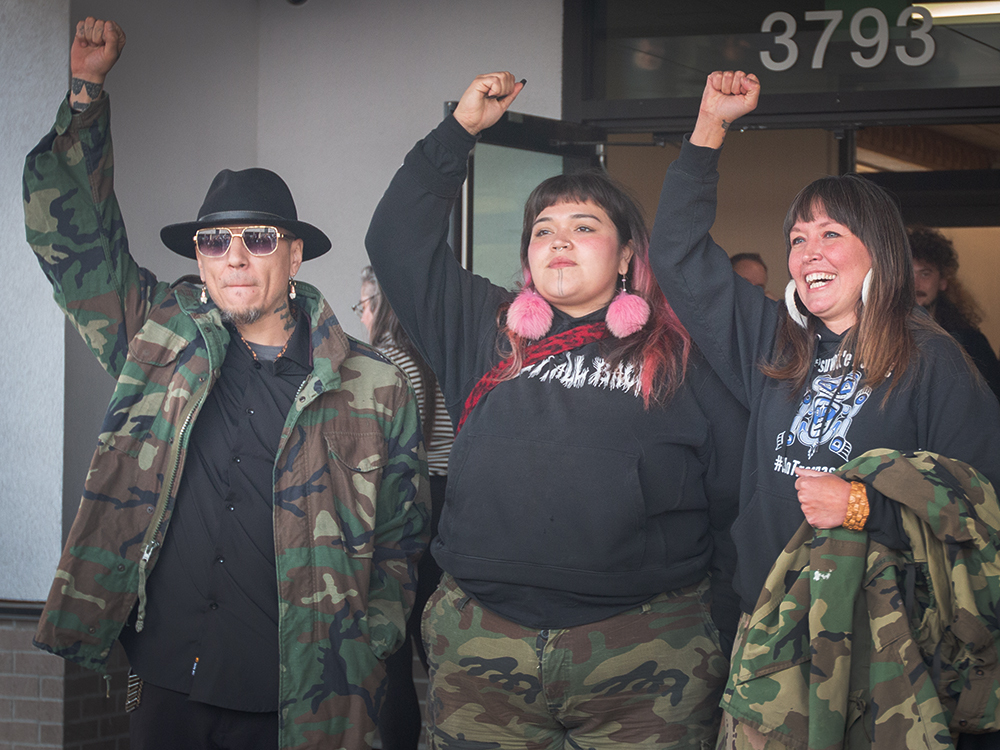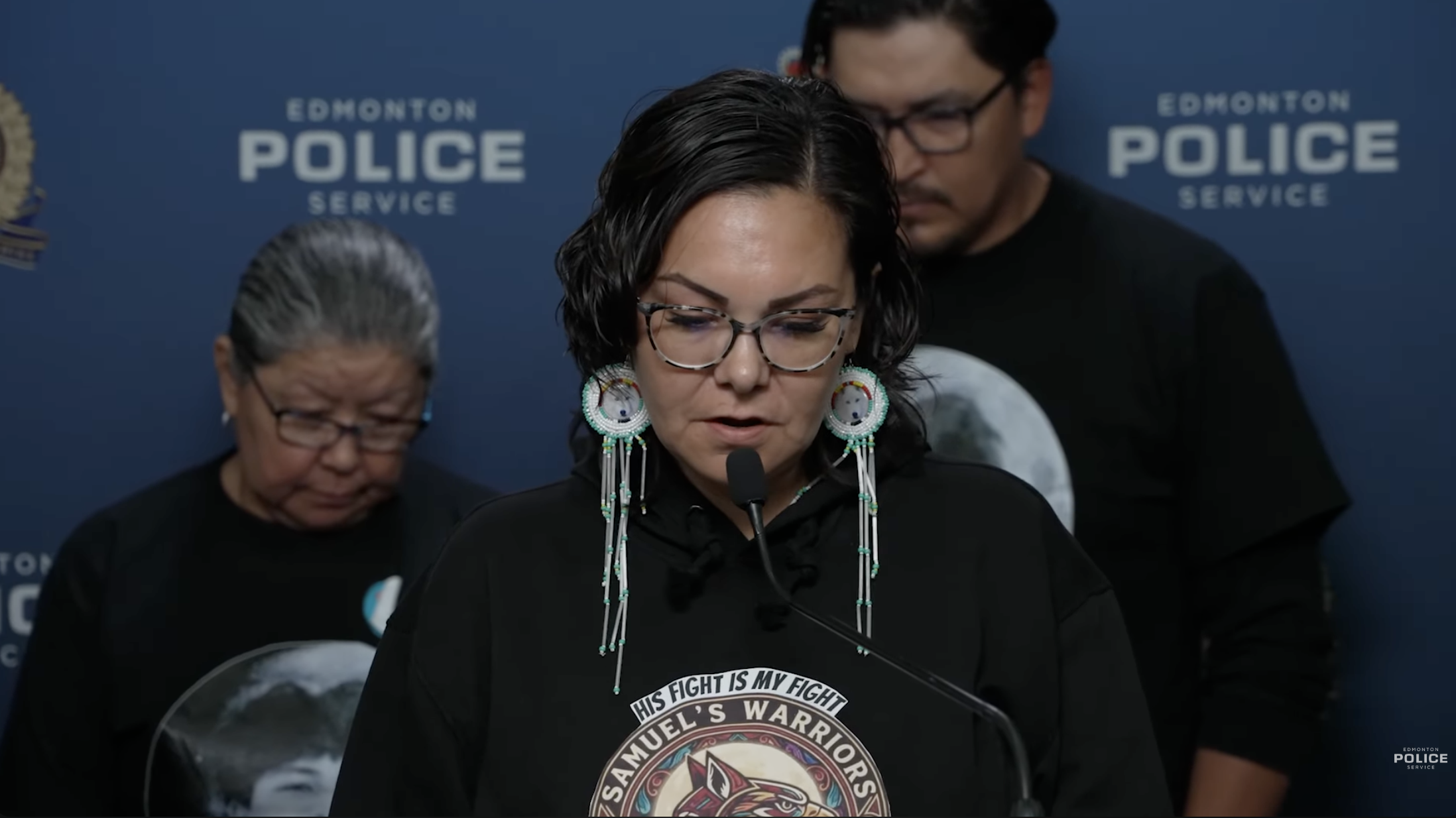‘We’re bringing the kids home’: Cowichan Tribes signs historic agreement to reclaim child and family services
The agreement supports the implementation of Quw’utsun laws, generational teachings and values for the benefit of Quw’utsun children and families.

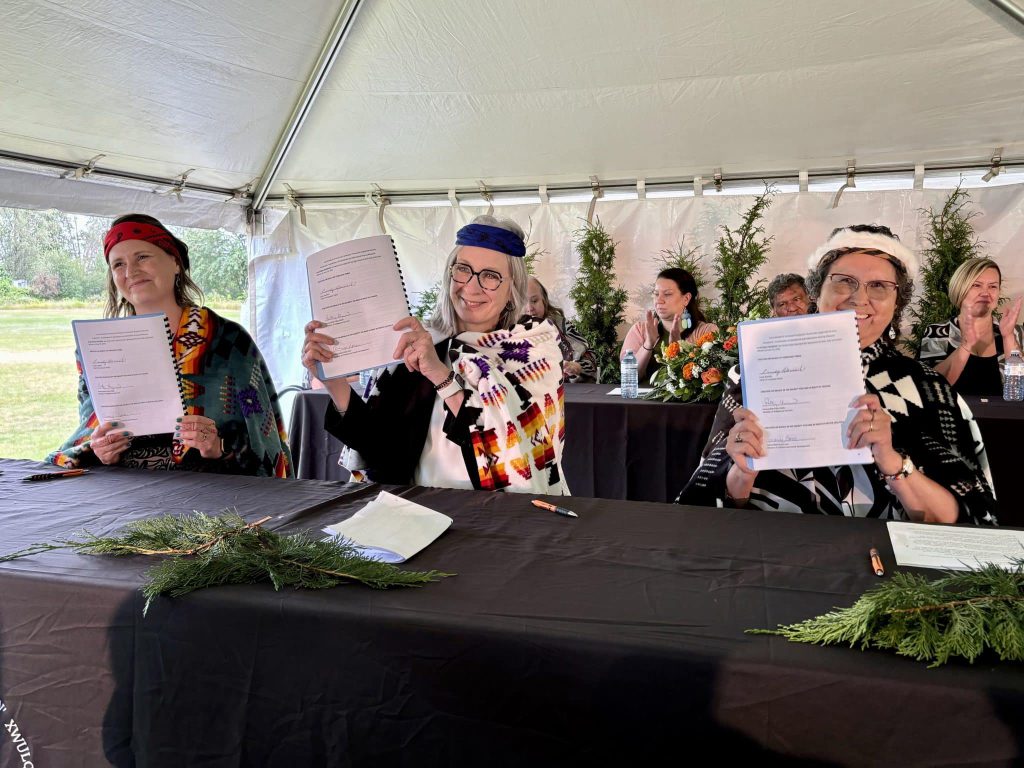
Joyful cheers and applause rang out as Cowichan Tribes (Quw’utsun) signed a landmark agreement with “B.C.” and “Canada” to reclaim full responsibility over its child and family services.
Sitting under a tent on Quw’utsun lands in “Duncan,” Chief Cindy Daniels (Sulsulxumaat) inked her signature alongside Patty Hajdu, the federal minister of Indigenous Services, and Grace Lore, the provincial minister of Children and Family Development.
The four-year agreement affirms that the Quw’utsun community will manage all facets of their child welfare — meaning they have the power to support and protect their children’s best interests as a community.
“It is such an emotional day for all of us. Today is historical,” said Chief Daniels during the event on June 24.
“It means a lot to our people to keep our family units together, to keep our kids with our families, learn their language, their culture, and feel a part of our community once again.”
‘We’re bringing the kids home’
Quw’utsun Peoples have been working to restore inherent rights to care for their children and families, based on their own culture and practices, for decades.
Though the Quw’utsun child and welfare agency Lalum’util’ Smun’eem has aimed to protect and stabilize family environments since 1993, it is governed by colonial laws which limit its role in supporting Quw’utsun children and families.
The pathway toward self-governance was cleared in 2019 with a tripartite Letter of Understanding that committed Cowichan Tribes, “Canada” and “B.C.” to recognize Quw’utsun jurisdiction, followed by a federal law that affirmed the inherent rights of Indigenous governments to self-determination over child welfare.
“We’re bringing the kids home. We’re keeping them with our families. We have over 700 on our waiting list, let’s start working and getting them home,” said Chief Daniels.
The signed co-ordination agreement supports the implementation of Snuw’uy’ulhtst tu Quw’utsun Mustimuhw u’ tu Shhw’a’luqw’a I’ Smun’eem (The Laws of the Cowichan People for Families and Children) for Quw’utsun peoples of “Vancouver Island” and the Gulf Islands, passed in 2023, with potential expansion across the province and country in the future.
The Law follows Quw’utsun snuw’uy’ulh (teachings) and values that ensure love, care and support for Quw’utsun children. It aims to foster family wellness with generational teachings and values. The Law also mandates aid to those community members in need of housing assistance, mental health support and other challenges.
“Now there is Indigenous law that states that it is the right of the community to make sure their families are intact and that children are cared for in a way that retains their connections to their culture, their language and their roots,” said Minister Patty Hadju.
Under the reinstated jurisdiction of children and family services, a child or youth will not be placed under provincial care in a foster home. Instead, Quw’utsun young people will be put into the custody of the Quw’utsun community.
The June 24 Quw’utsun agreement is the eighth of its kind in “Canada” and the second in “B.C.” after the Splatsin Stsmamlt agreement in March of last year.
“Today is not just about being hopeful for the future. It is about real optimism because we’re putting in place our law with the resources and support to make real change,” said Chief Daniels.
Part of those supports and resources will come in the form of funding to provide Cowichan Tribes with a sustainable path forward. “Ottawa” is providing approximately $207.5 million and the provincial government is providing $22 million to back the four-year agreement.
Since the ratification vote last fall, the Tribe’s leadership teams have been working to put into place all of the elements needed for the coordination agreement and for a Child and Family Services Authority. This includes setting up a board of directors and a CEO, yet to be named.
“We are leaving behind the practice of child apprehension and placements that have alienated children from their families and our community for generations. Practices that have repeatedly caused trauma,” said Chief Daniels.
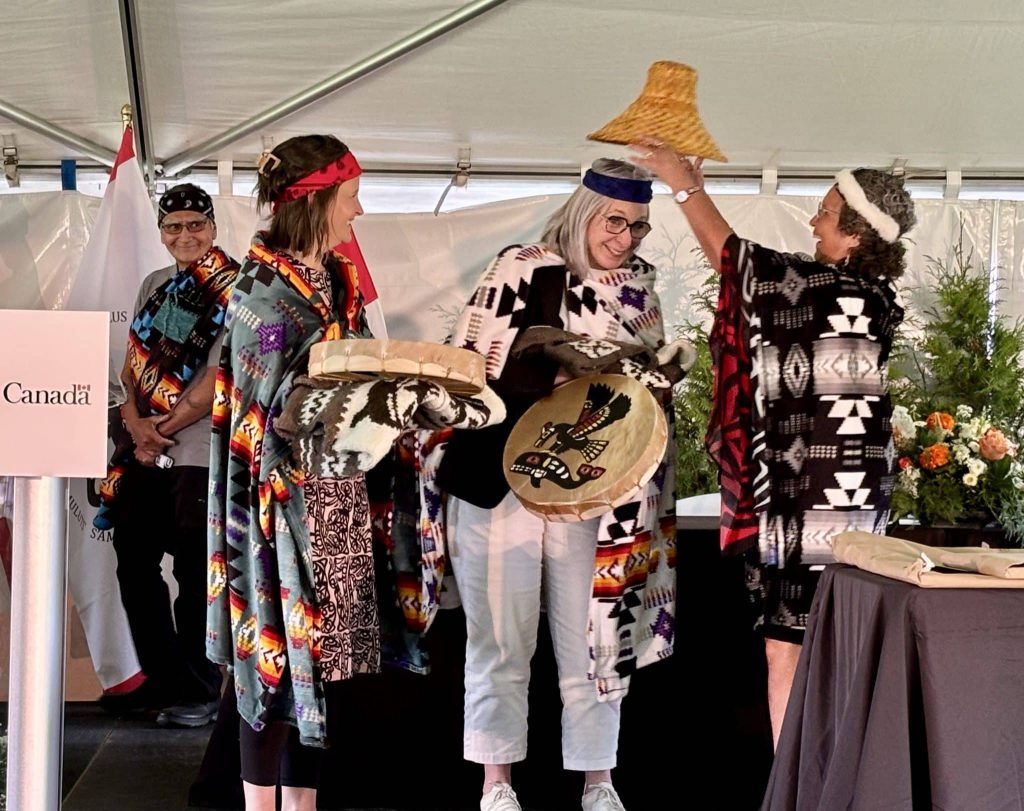
The Quw’utsun community reacts
The June 24 signing was a bittersweet ceremony, in some respects. Ceremonial dancers and optimistic speeches occurred alongside solemn reflections of past injustices.
Genevieve Johnny, a Cowichan Tribes Elder and educator, asked that the past not be forgotten in the celebration of the agreement.
“Our parents and grandparents didn’t have an easy life. I’ve seen a lot of my family members apprehended and there was nothing we could do,” said Johnny.
“This is just a small piece of what our people need to get back.”
Chiel Daniels spoke of the trauma underlying the progress the agreement promises the Quw’utsun Peoples.
“We’ve gone through residential school since the late 1890s, where the government decided to remove the children from their homes. We lost our culture, we lost our language. Some kids were removed at age four, and they didn’t come back home until Grade 12 — if they even reached Grade 12,” said Daniels.
Daniels and the ministers all cited the ongoing generational trauma from the Sixties Scoop, a term used to describe the apprehension, or “scooping” of Indigenous children from their communities that occurred throughout the 1960s.
“They were forced into non-First Nation foster homes, ripped from the community, their culture and their language. So we’re still struggling today trying to get our language back into our community,” added Daniels.
Hajdu acknowledged the history colonialism in her speech about the historic agreement.
“This was an intentional decision by the Government of Canada and many provinces and territories, to continue to control the narrative in this country, the resources in this country and the power in this country,” she said.
“And so it’s extremely poignant for me to stand here in front of you to try to make amends for a country that has brought so much harm on people.”
By population, Quw’utsun Peoples are the largest First Nation in the province.
“Quw’utsun may be way behind in the treaty [process], but we’re going to get there. I believe it,” said Johnny.
“I’m so proud to stand here and witness what took place here today.”
Chief Daniels was emotional as she addressed the crowd in attendance who came to witness the signing.
“It’s so exciting. For all the years I sat at that console table. We’ve been working in this direction and today is a really, really big day for our community. For our youth, for our children, she said.
“Today, we set our people on a new path for the bright future that we deserve. A future filled with family connection, enriched by our culture and language.”
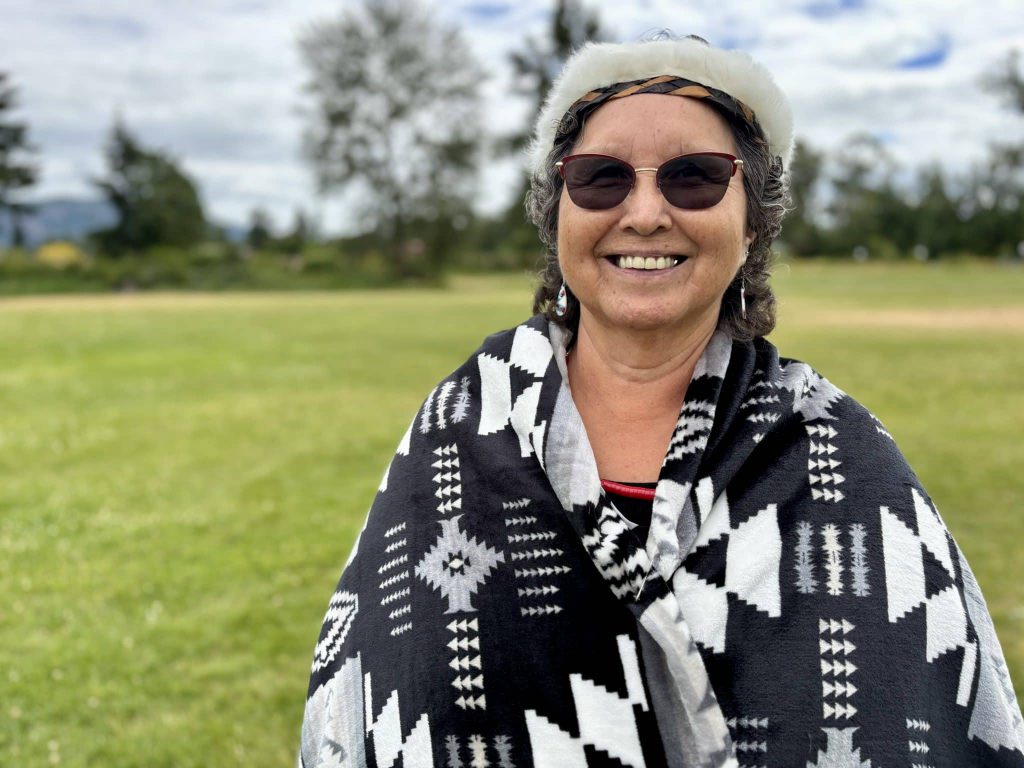
Author
Latest Stories
-
‘Bring her home’: How Buffalo Woman was identified as Ashlee Shingoose
The Anishininew mother as been missing since 2022 — now, her family is one step closer to bringing her home as the Province of Manitoba vows to search for her
-
Land defenders who opposed CGL pipeline avoid jail time as judge acknowledges ‘legacy of colonization’
B.C. Supreme Court sentencing closes a chapter in years-long conflict in Wet’suwet’en territories that led to arrests
-
Samuel Bird’s remains found outside ‘Edmonton,’ man charged with murder
Officers say Bryan Farrell, 38, has been charged with second-degree murder and interfering with a body in relation to the teen’s death



